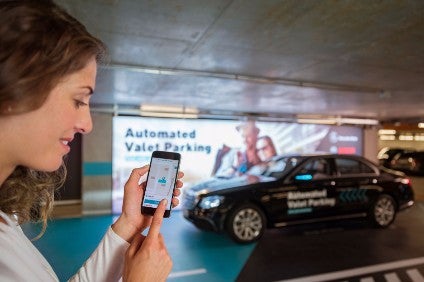
Daimler and Bosch jointly are demonstrating driverless parking (automated valet parking) in the multi-storey car park at the Mercedes-Benz museum in Stuttgart.
Cars now drive – without a human driver – to an assigned parking space commanded by smartphone without any need for human intervention.

Discover B2B Marketing That Performs
Combine business intelligence and editorial excellence to reach engaged professionals across 36 leading media platforms.
"Automated valet parking marks an important milestone on the way to autonomous driving," said Daimler which recently trialled autonomous driving of cars from the end of the assembly line to dispatch storage lot.
The pilot project is claimed to be the world's first infrastructure-supported system for an automated drive up and park service in real life dual operating mode. From the beginning of 2018, visitors will be able to use the service themselves, saving the time needed to drive cars into spaces.
"Parking will be an automated process in the future. By applying an intelligent multi storey car park infrastructure and networking it with vehicles, we have managed to realise driverless parking substantially earlier than planned," said Gerhard Steiger, director of the chassis systems control unit at Bosch.
Anyone can reserve a car with a smartphone app. The vehicle rolls into the pick-up area autonomously to start the journey. On return, the customer parks the vehicle in the drop off area and 'hands it back' by app. After being registered by the intelligent system in the parking structure, the car is started and guided to an assigned space.
Driverless parking is made possible by Bosch building infrastructure Mercedes-Benz car technology. Sensors installed in the car park monitor the driving corridor and its surroundings and steer the vehicle. The technology on the car performs driving manoeuvres in response to commands from the infrastructure and stops it as needed. Bosch supplied the sensors and communications equipment and Daimler the museum car park and pilot vehicles.
An extensive trial and commissioning phase follows today's (24 July 2017) launch. The project was supervised by Stuttgart regional council and the federal state transport ministry and by appraisers from the TÜV Rheinland technical inspection authority. Before the driverless service goes into operation at the beginning of 2018 – claimed as a global first – final approval from the licensing authority is needed.
Automaker and supplier will use the project to acquire experience regarding users' handling of automated valet parking. Other multi-storey car parks can be retrofitted with the infrastructure technology.
"For the operators of multi-storey car parks, driverless parking means more efficient use of the available parking space: up to 20% more vehicles fit into the same space," Daimler said.






